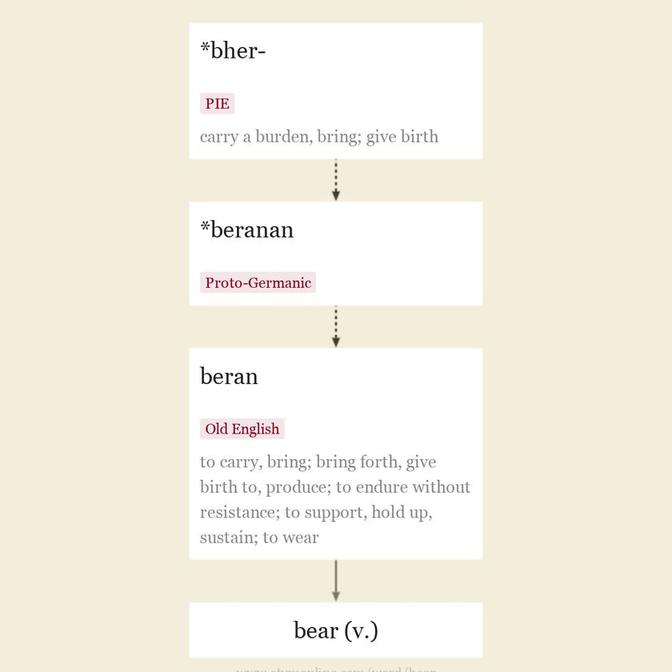bearable (adj.)
"endurable," 15世纪中叶,来自 bear(动词)+ -able。相关词汇: Bearably。
bearable 的相关词汇
英语形容词的常见词尾和构词元素(通常基于动词),通常添加“能够; 允许; 值得; 需要; 被______ed”的概念,有时是“充满,引起”的意思,来自法语 -able 和直接来自拉丁语 -abilis。它正确的形式是 -ble,来自拉丁语 -bilis(元音通常来自被后缀的动词的词干结尾),它代表了 PIE 的 *-tro-,一个用于形成工具名词的后缀,与英语 rudder 和 saddle(名词)的第二个音节同源。
在英语中是一个活生生的元素,用于新的构词形式,无论是来自拉丁语还是本土词汇(readable, bearable),也与名词一起使用(objectionable, peaceable)。有时具有积极的意义(suitable, capable),有时具有中性的意义(durable, conformable)。它的意义变得非常灵活,例如一个 reliable witness,一个 playable foul ball, perishable goods。17世纪的作家有一个 cadaverable “致命的”。
To take a single example in detail, no-one but a competent philologist can tell whether reasonable comes from the verb or the noun reason, nor whether its original sense was that can be reasoned out, or that can reason, or that can be reasoned with, or that has reason, or that listens to reason, or that is consistent with reason; the ordinary man knows only that it can now mean any of these, & justifiably bases on these & similar facts a generous view of the termination's capabilities; credible meaning for him worthy of credence, why should not reliable & dependable mean worthy of reliance & dependence? [Fowler]
以一个具体的例子来说明,只有一个能干的语言学家才能告诉我们 reasonable 是来自动词还是名词 reason,它最初的意义是可以推理出来的,还是可以推理的,还是可以被推理说服的,还是有理智的,还是听取理由的,还是符合理性的; 普通人只知道它现在可以意味着任何一个,因此合理地认为这个词尾的能力是广泛的; 对他来说, credible 的意思是值得信任的,为什么 reliable 和 dependable 不能意味着值得依赖和信任?[福勒]
在拉丁语中, -abilis 和 -ibilis 取决于动词的屈折元音。因此,在古法语、西班牙语、英语中有变体形式 -ible。在英语中, -able 倾向于与本土(和其他非拉丁语)词汇一起使用, -ible 则与明显的拉丁语起源的词汇一起使用(但也有例外)。这个拉丁语后缀在词源上与 able 没有关联,但它长期以来一直与之相关联,这可能有助于它作为一个活生生的后缀的活力。

古英语 beran “搬运,带来; 生育,产生; 忍受无抵抗; 支持,扶持; 穿着”(第四类强动词; 过去式 bær,过去分词 boren),源自原始日耳曼语 *beranan(源头还包括古撒克逊语 beran,古弗里西亚语 bera “搬运,生育”,中古荷兰语 beren “搬运儿童”,古高地德语 beran,德语 gebären,古诺尔斯语 bera “搬运,带来,忍受; 生育”,哥特语 bairan “搬运,生育”),源自 PIE 词根 *bher-(1)“搬运负担,带来”,也是“生育”的意思(尽管只有英语和德语保留了这个意思,俄语有 beremennaya “怀孕”)。
古英语过去式 bær 变成了中古英语 bare; 另一种 bore 开始出现于约1400年,但 bare 仍然是文学形式,直到1600年后。borne 表示“搬运”的过去分词和 born 表示“生育”的过去分词的区别始于18世纪后期。
许多意义都来自“通过压力向前移动”的概念。到 bear down “强行前进”(尤其是在航海中)的意思来自1716年。这个动词自约1300年起就被用来表示“作为属性或特征拥有”。“不下沉地支撑”这个意思来自1520年代; 到 bear (something) in mind 的意思来自1530年代; 表示“倾向于,被引导”(以某种方式)的意思来自约1600年。到 bear up 的意思是从1650年代开始的,表示“坚定,有勇气”。
15世纪中期,来自 un-(1)“不”和 bearable。相关词汇: Unbearably。古英语中有 unberendlic。